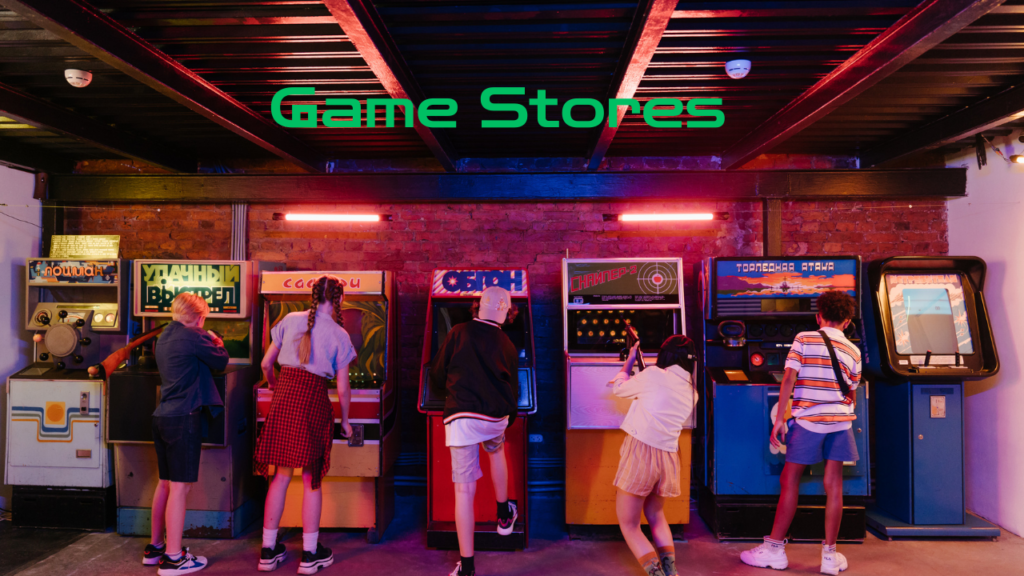In this day and age where everything is going digital, game shops are still fundamental in the gaming industry. Physical outlets provide experiences that Online Services cannot provide. Game shops are from looking at the physical collection of the games available to sign up for the available local competition and every gamer or gamer’s interests. This elaborative discourse will delve into the universe of game stores, their significance of them, and the role they play in the gaming environment.
What Are Games Stores?
Game shops are defined as retail businesses that mainly sell video games and other equipment, such as board games, card games, and related materials. Such establishments have different gaming interests, and most of the time, they serve as centers for vertical communities of people who enjoy the same games.
The Evolution of Game Stores
The gaming stores show progress with every coming decade. They have changed a great deal at their early stages.
Early Days
The 1970s and 1980s game shops were mostly purveyors of retail tabletop games, paper roleplaying games, and the earliest generations of arcade machine and console video games. Most of them were small franchise-type businesses serving specific fan bases.
The Video Game Boom
With the rise in the popularity of video games in the 1990s and 2000s, gaming stores have grown in stock to house various console and PC games. During this period numerous retail chains focusing on gaming came up.
Modern Game Shops
The aspiring game shops of today have embraced the dynamics of the market by broadening the scope of their operations. Customers are offered a combination of physical as well as digital games, merchandise, and experience in the shops painted to entice them.
Types of Game Stores
Some game shops are more skewed towards parts of the gaming industry than others, hence the different types:
- Specialized Video Gaming Stores
These shops are primarily devoted to games for existing video game consoles and PC systems. They usually have a selection of new and pre-owned games, gaming ancillary equipment, and even game consoles.
- Tabletop Game Shops
Aiming at board games, card games, or even role-playing games, these include customer areas to play with the games or the events inside the Stores.
- Hybrid Game Shop
Most of today’s game stores tend to available video games, tabletop games as well, and most if not all kinds of game-related merchandise to most customers.
- Retro Game Stores
These shops sell only ”old” video games and” retro” consoles and are usually visited by collectors or those loving memories of youth.
The Importance of Game Stores in the
Gaming Ecosystem
Importance of Game Shops to the Industry and the Games Community:
Building a Community
Games are also places where gamers can go to spend time doing what they like. These structures organize events, competitions, and game evenings that unite people.
Interaction with Products
Game shops are the opposite of online retailers because they permit customers to touch and examine the products before they decide to buy them. This is important, especially for board games and collectibles.
Expert Advice
Gamers turn out to be employees of some game stores and help customers by giving recommendations or advice according to their preferences and level of experience.
Helping Local Communities
Independent game store do a lot for the local community as they provide employment opportunities and ensure that the money circulates in the local area.
Preserving Gaming History
Certainly, some gaming stores particularly those focusing on old-school gaming genres assist in the documentation of the gaming era by offering classic games and gaming devices before they become obsolete.
Other Services Available from Game shops
The contemporary game store provides a plethora of services to customers in a bid to retain their loyalty:
- Trade-In Programs
To some game retailers, a customer may return used games for cash or another game thus encouraging the playing of different games rather than sticking to one game for too long.
- Maintenance Work
A few game retail shops provide maintenance work for gaming consoles, gaming control sticks, and other gaming entities.
- Game Rentals
Playing outlets have provisions for game rentals enabling clients to sample games before purchase.
- Special Orders
Computer game retail shops sometimes accept special requests for members for hard-to-get or no-longer-sold games.
- Event Hosting
The majority of game- shops organize regular social functions like movie openings, sporting events, and demonstration events for purposes of customer retention and recruitment in the business.
The Future of Game Store
With the growing trends in gaming even gaming shops have been changing strategies to fit where the industry is heading:
Embracing Digital Distribution
Even recently many gaming retail chains have started selling game codes and additional content without requiring the physical sales of discs.
Marketing New Doctrines
Gaming premises are more and more inclined towards offering additional services within their facilities such as virtual reality experience stations, esports screenings, and dine-in gaming areas.
Expanding the Audience
To reach out to more customers, gaming retail shops are now going beyond games alone to selling merchandise related to gaming such as toys, comic books, and even clothes.
Online Integration
Most physical game retail shops are enhancing their operations by facilitating e-commerce and providing regular updates through other forms of communication such as social networking sites.
Conclusion
Game stores are very important for the gamers’ community. They supply various games, accessories, and professional support. Regardless if you enjoy purchasing things off the ground in a real place or by looking at a screen, many possibilities will help improve your gaming. After all, a good game shop helps find the cheapest prices, the latest titles, and therefore, the best possible experience from one’s gaming excursion.
FAQs
1. What can I expect to find in a game shop?
Games’ retailing shops often contain video games, consoles, accessories, collectibles, and most cases even new or second-hand discount items. Other shops may also sell board and card games.
2. Are online game stores more convenient than brick-and-mortar game shops?
Online game shops are more convenient and have a larger inventory, whereas physical shops allow for experience, purchase, and trade-in of products. Both have their pros and cons depending on which is suitable for you.
3. Do game shops accept old games for trade?
Yes, many game shops especially big chains like GameStop – do offer trade-in programs for old games and other types of video game hardware exchange programs.



